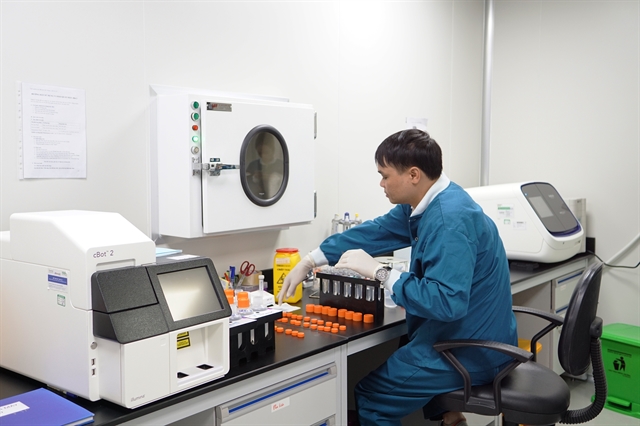 Society
Society


|
| A researcher works at the Vinmec Research Institute of Stem Cell and Gene Technology in Hà Nội. — VNS Photo Thanh Hải |
HÀ NỘI — The Vinmec Medical System’s research group has revealed initial results of the Vietnamese genome decoding project after more than two years of research.
The project, entitled "Research on the Vietnamese genome", is the first massive database of Vietnamese genomes, conducted from decoding the genomes of 305 healthy Kinh people in combination with data of 101 previously published genomes.
Research results published more than 24 million points of change, including more than 700 thousand completely new points. Accordingly, the Vietnamese genome is different from the genomes of other populations, which is reflected in the large difference in the frequency of occurrence of many genetic changes.
Specifically, research found that 1.24 million changes appear in Kinh people, but appear very little in other populations. This is an important contribution, providing a highly reliable reference base for future biomedical studies and applications on Vietnamese people’s health related to genetics.
Analysing the Vietnamese genome showed the difference of Kinh people to other populations. Compared to the international database of 1,000 human genomes, about one third of the genetic variation in the Kinh population does not occur in the Han Chinese population and vice versa.
In particular, analysis results of ancestral origin of human populations showed that current Southeast Asians, including the Kinh Vietnamese people, have their roots in ancient Southeast Asians.
The data also confirms that Kinh and Thai people have high genome homology in genomes and close evolutionary relationships. Meanwhile, the interference and gene transfer from East Asian populations to Vietnamese Kinh population is negligible.
Data from the study also contributes to reinforce the scientific hypothesis that people from Africa settled in Southeast Asia and then migrated deep into the continent from the south to the north.
For the first time, the study was conducted independently by all Vietnamese scientists at Vinmec Research Institute of Stem Cell and Gene Technology (VRISG) from December 2016 to March 2019.
"Genetic data closely relates to health and pathology, contributing to treat cancer issues and genetic diseases, especially in the development trend of individualised medicine. Therefore, the research is an important reference basis for biomedical studies related to health, disease and anthropology of Vietnamese people, especially the development of methods for early detection of cancer genes, metabolism and response to treatment drugs, genetic diseases or neurodegeneration problems like Parkinson’s and Alzheimer’s,” said Prof. Dr. Nguyễn Thanh Liêm, Director of VRISG, head of the project.
To date, the Vietnamese genome database is considered to be the most complete dictionary of the Vietnamese human gene data system. Previously, domestic scientists often had to refer to genomes from foreign populations.
The project’s results have recently been published in Human Mutation, an international medical journal of human genetics. The study is also available on genomes.vn website. This is an important reference data source for biomedical, pharmacological and historical research and application. — VNS




